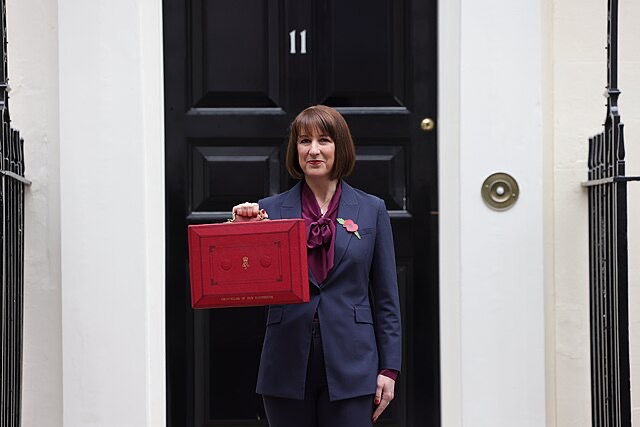The rate of inflation has risen by more than expected on the back of fuel and food price pressures, according to official figures which have prompted accusations of an own goal for the chancellor.
The Office for National Statistics (ONS) reported a 3.6% level for the 12 months to June – a pace not seen since January last year. That was up from the 3.4% rate seen the previous month, whilst economists had expected no change.
The unexpected jump adds pressure on households already struggling with the cost of living and complicates the Bank of England’s decision on interest rates next month.
ONS acting chief economist Richard Heys said: “Inflation ticked up in June driven mainly by motor fuel prices which fell only slightly, compared with a much larger decrease at this time last year. Food price inflation has increased for the third consecutive month to its highest annual rate since February of last year. However, it remains well below the peak seen in early 2023.”
A key driver of food inflation has been meat prices, with beef costs shooting up particularly sharply. According to Association of Independent Meat Suppliers data reported by FarmingUK, beef prices have risen by more than 30% over the past year.
High global demand alongside raised production costs have been blamed. The Agriculture and Horticulture Development Board forecasts UK beef production will decrease by 5% in 2025 whilst domestic consumption is expected to grow by 1%.
But Kris Hamer, director of insight at the British Retail Consortium, said: “While inflation has risen steadily over the last year, food inflation has seen a much more pronounced increase. Despite fierce competition between retailers, the ongoing impact of the last budget and poor harvests caused by the extreme weather have resulted in prices for consumers rising.”
It marked a clear claim that tax rises imposed on employers by Rachel Reeves from April have helped stoke inflation. The chancellor raised employers’ National Insurance contributions in her October Budget, with the changes taking effect from 6 April.
Balwinder Dhoot, director of sustainability and growth at the Food and Drink Federation, said: “The pressure on food and drink manufacturers continues to build. With many key ingredients like chocolate, butter, coffee, beef, and lamb, climbing in price – alongside high energy and labour expenses – these rising costs are gradually making their way into the prices shoppers pay at the tills.
Chancellor Rachel Reeves said of the data: “I know working people are still struggling with the cost of living. That is why we have already taken action by increasing the national minimum wage for three million workers, rolling out free breakfast clubs in every primary school and extending the £3 bus fare cap.”
But there is more to do and I’m determined we deliver on our Plan for Change to put more money into people’s pockets.
The wider ONS data is a timely reminder of the squeeze on living standards still being felt by many households – largely since the end of the COVID pandemic and subsequent energy-driven cost of living crisis.
The 12-month inflation rate for food and non-alcoholic beverages reached 4.5% in June, marking the third consecutive monthly increase. This is the highest level since February 2024, though it remains well below the peak of 19.2% recorded in March 2023.
Record rental costs alongside elevated borrowing costs – the latter a result of the Bank of England’s action to help keep a lid on inflation – have added to the burden on family budgets. Most are still reeling from the effects of high energy bills.
The cost of gas and electricity is among the reasons why the pace of price growth for many goods and services remains above a level the Bank would ideally like to see. The Bank’s target for inflation is 2%.
Added to that is the toll placed on finances by wider hikes to bills. April saw those for water, council tax and many other essentials rise at an inflation-busting rate.
The inflation figures, along with employment data due tomorrow, are the last before the Bank of England is due to make its next interest rate decision on 7 August.
The vast majority of financial market participants, and many economists, expect a quarter point cut to 4%. Markets are currently pricing in an 82% chance of a rate reduction next month.
That forecast is largely based on the fact that wider economic data is suggesting a slowdown in both economic growth and the labour market – twin headaches for a chancellor gunning for growth and juggling hugely squeezed public finances.
The economy shrank for the second month in a row in May, according to GDP figures published last week. This followed contractions of 0.1% in May and 0.3% in April.
Suren Thiru, economics director at the Institute of Chartered Accountants in England and Wales, said: “While June’s hot inflation won’t deter policymakers from sanctioning an August policy loosening, given mounting worries over economic conditions, these figures may increase caution over the pace of future rate cuts.
The Bank has cut rates twice this year, in February and May, reducing the base rate from 4.5% to 4.25%. Governor Andrew Bailey said last month that interest rates remain “on a gradual downward path” but warned “the world is highly unpredictable.
Shadow Chancellor Mel Stride said the blame for Wednesday’s increase lay squarely with the Labour government and the financial decisions they had made. “Inflation is far too high and the reason for this can be laid at this government’s door,” he said.
The FTSE 100 shrugged off the inflation jump, opening 0.1% higher on Wednesday morning. The mid-cap FTSE 250, which is more exposed to the domestic economy, fell 0.2%.
Follow for more updates on Britannia Daily
Image Credit:
The Chancellor delivers the Autumn Budget 2024 – Image by UK Government, licensed under Open Government Licence v3.0 (OGL), via Wikimedia Commons.
View Image



